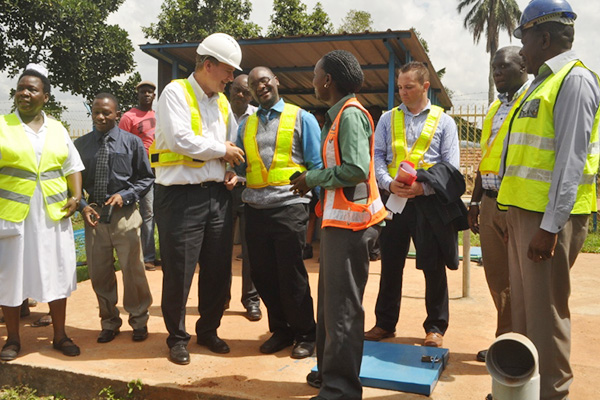
Uganda Breweries though the EABL foundation- Water Of Life program yesterday, fulfilled their promise to Entebbe Grade B hospital when they handed over 100,000 cubic litre capacity underground water tank and broke ground to commence work on another 100,000 cubic litre tank.
More than 200,000 people in Wakiso district will benefit from improved access to safe water at Entebbe Grade B Hospital at the end of the project, which is planned to provide a facility that can provide a capacity of 200,000 cubic litres to the hospital. The underground tanks were a request from the hospital, which sought to bring efficiency to its operations by harvesting rain water, which can be used in addition to the water being supplied by NWSC.
Speaking at the event, the EABL Supply Chain Director, Peter Vogtlander said “Last year we were here and we pledged to support Entebbe Hospital with a water harvesting system comprising of a 100,000 litre underground tank, filtration, pump and treatment system. We are delighted to be here because we made a promise and we have kept it.”
“We also promised to increase the capacity of the underground tank so as to boost the water requirements of Entebbe Hospital and that is why we are here today. We are embarking on the expansion plan and very soon we shall fulfil our promise with the second 100,000 capacity tank to meet the hospital requirements”.” He added
Entebbe Grade B hospital is the only government hospital serving people in Wakiso including the islands of Lake Victoria. The hospital is strategically located near the Entebbe International Airport. It is expected to handle any eventualities including crashes at the airport and was in-charge of the emergency unit managing the recent ebola virus.
The second donation worth Ushs 205 million is the second step in a committed effort to support access to safe and clean water at the Entebbe Grade B Hospital. This will bring the total investment into this project to Ushs 495 million, including phase one.
The Clean Water equipment offered to the hospital will have significant savings on their water bills and free up resources to improve other medical care and services offered.
Commissioning the water project at Entebbe Referral Hospital, the state Minister of Health, Hon. Chris Baryomunsi said “Uganda Breweries has displayed great corporate citizenship by providing this facility to the people of Entebbe. As a ministry, one of our major challenges is managing our resources to bring down bills in order to afford proper healthcare and sanitation for our people. Today I am delighted to join hands with Uganda Breweries and say thank you for helping us in our struggle to deliver a health services to all Ugandans.”
The hospital Medical Superintendent, Dr. Moses Muwanga commended UBL for this extra support and thanked the Ministry of health for allowing the partnership with the Brewery in support of the health sector in initiatives like these.
“Hospitals cannot run without water which is paramount in every section. Over the last year that we have had this facility, we have managed to reduce our water bills considerably and at he same time we have had more water than usual to carry out our functions.” He said.
He added, “Uganda Breweries promised us more support on top of the 3 10,000 capacity tanks they gave us previously and this water harvesting system. Today they have come to fulfil that promise. We urge all other corporates to hold hands with our government, with our ministry and help Uganda realise the right standard of care within medical services..”
Uganda Breweries Limited (UBL) through EABL Foundation has over the years, not only played a significant role in providing access to clean, sustainable safe water in Uganda, but also been a major contributor to sustainable farmer household incomes through local raw materials sourcing and support to farmers. The Company also runs a scholarship programme for students at Public Universities.
The Clean Water equipment offered to the hospital will have significant savings on their water bills and free up resources to improve other medical care and services offered.

